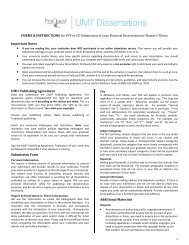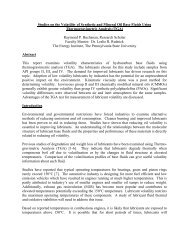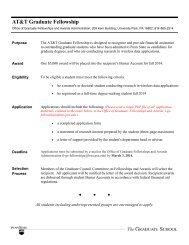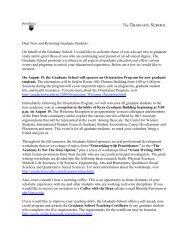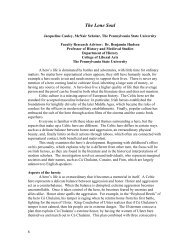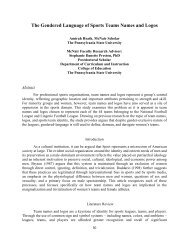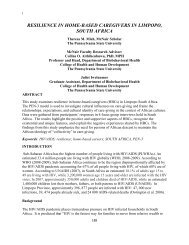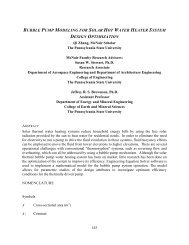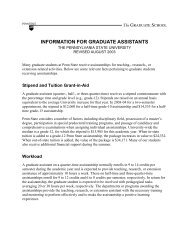1 GRADUATE COUNCIL MEETING 18 January 2012 102 Kern ...
1 GRADUATE COUNCIL MEETING 18 January 2012 102 Kern ...
1 GRADUATE COUNCIL MEETING 18 January 2012 102 Kern ...
You also want an ePaper? Increase the reach of your titles
YUMPU automatically turns print PDFs into web optimized ePapers that Google loves.
PROFESSOR CHIMAY J. ANUMBA, Head, Department of Architectural Engineering<br />
Page E21<br />
This major emphasizes the application of scientific and engineering principles to the planning, design, and construction of<br />
buildings and building systems. The goal of the program is to provide engineering graduates with the best education available for<br />
careers in the building professions. Graduates will have the ability to practice as registered professional engineers in a variety of<br />
areas, both public and private, related to the planning, design, construction, and operation of buildings and to assume a place of<br />
leadership in society.<br />
Four options are available in the ten-semester major: the Construction option, which emphasizes building construction<br />
engineering and construction management; the Lighting/Electrical option, which emphasizes the design of lighting and electrical<br />
systems for buildings; the Mechanical option, which emphasizes the design of heating, ventilating and air-conditioning systems in<br />
buildings; and the Structural option, which emphasizes the analysis and design of building structural systems. Courses in<br />
architectural design are included in all options to give the engineering student an understanding of architectural design and its<br />
relation to engineering. Courses in engineering design are provided throughout the program. The design experience is culminated<br />
in a year-long capstone design course.<br />
A limited number of undergraduate students in the B.A.E. program will be considered for admission to the integrated<br />
undergraduate/graduate program leading to the B.A.E. and the M.A.E. degrees. Students who are currently enrolled in the 7th<br />
semester of the B.A.E. degree program may be admitted to the integrated B.A.E./M.A.E. program, following a positive review of<br />
an application specific to this program by the faculty committee on graduate admissions. Students must have attained a GPA of at<br />
least 3.0 and must have attained a grade of C or better in all classes listed as A E. Students admitted to the integrated program<br />
must maintain a GPA in all classes used toward the M.A.E. degree of at least 3.0.<br />
A limited number of undergraduate students in the B.A.E. program will be considered for admission to one of two integrated<br />
undergraduate-graduate degree programs. The first leads to the student earning both the B.A.E. and M.A.E. degrees and<br />
involves a graduate-level component in the capstone senior project. The second provides the student with the opportunity to earn<br />
both the B.A.E. and M.S. degrees and involves a research-oriented thesis in addition to the capstone undergraduate senior<br />
project. Students who are currently enrolled in the 7th semester of the B.A.E. degree program may apply to one of the two<br />
integrated programs and will be admitted following a positive review by the faculty committee on graduate admissions. To be<br />
considered for admission to either program, students must have attained a GPA of at least 3.0 and a grade of C or better in all<br />
classes listed as AE. A commitment from an AE graduate faculty member to serve as the student’s M.S. thesis adviser is<br />
necessary for admission to the B.A.E./M.S. program. Students admitted to an integrated program must maintain a GPA in all<br />
classes used toward the M.A.E. or M.S. degree of at least 3.0. Students must complete a minimum of 172 credits for both the<br />
integrated B.A.E./M.A.E. and B.A.E./M.S. degree programs, <strong>18</strong> of which must be at the graduate level (500, 600 or 800-level).<br />
For the B.A.E./M.A.E. degree program, all of graduate credits are course credits. For the B.A.E./M.S. degree program, a thesis<br />
is required and six credits of thesis research (600 or 610) must be included in the candidate’s academic course plan.<br />
The professional degree, Bachelor of Architectural Engineering, is granted upon the satisfactory completion of the five-year<br />
program.<br />
Graduates, after several years in practice, are engaged in a professional career in the building industry as follows.<br />
• Graduates, with the appropriate experience, are qualified and competent to sit for the professional engineering exam.<br />
• Graduates are capable to meet the challenges of the engineering work environment. The graduates have assumed some<br />
leadership responsibilities.<br />
• Graduates are capable of solving design and project related problems based on sound engineering principles as<br />
demanded by their work.<br />
• Graduates are successfully conducting multi-disciplinary/inter-disciplinary interactions as required by their work.<br />
• Graduates are engaged in service activities in the public and professional realms.<br />
For the B.A.E. degree in Architectural Engineering, a minimum of 160 credits is required. This baccalaureate program in<br />
Architectural Engineering is accredited by the Engineering Accreditation Commission of ABET, Inc., 111 Market Place, Suite<br />
1050, Baltimore, MD 21202-4012; telephone: 410-347-7700; www.abet.org (Opens New Window).<br />
Scheduling Recommendation by Semester Standing given like (Sem:1-2)<br />
GENERAL EDUCATION: 45 credits<br />
(33 of these 45 credits are included in the REQUIREMENTS FOR THE MAJOR)<br />
(See description of General Education in this bulletin.)



